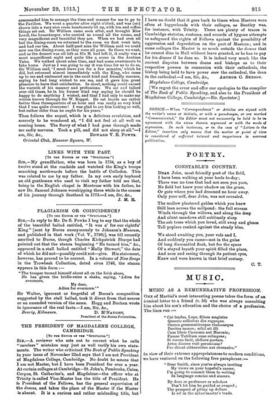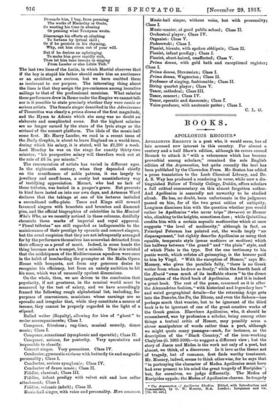MUSIC•
MUSIC AS A REMUNERATIVE PROFESSION.
ONE of Martial's most interesting poems takes the form of an ironical letter to a friend (v. 56) who was always consulting him about his son's education and the choice of a profession. The lines run :—
"Cui tradas, Lupe, Miura magistro Quaeris sollicitus din rogasque. Omnes grammaticosque rhetorasqne Devites moneo ; nihil sit illi Cum libris Ciceronis aut Maronis ; Famae Tutilium suae relinquas ; Si versus facit, abdices poetam. Artes discere vult pecuniosas? Fac discat citharoedus aut choraules."
In view of their extreme appropriateness to modern conditions, we have ventured on the following free paraphrase :— " Dear Smith, since you're always inviting My views on your hopeful's career, I'm going to commit them to writing In language concise and sincere.
By dons or professors or scholars
Don't let him be guided or swayed ; The prospect of piling up dollars
Is nit in the schoolmaster's trade.
Di'suade him, I beg, from perusing The works of Macaulay or Grote, Or wasting his time in abusing Or praising what Tennyson wrote.
Discourage his efforts at climbing To fortune by lyrical skill ; Or if he persists in his rhyming, Why, cut him clean out of your will.
But if he desires an upbringing To make him grow rapidly rich, Then let him take lessons in singing From Lauder or else Little Tich.'
The last two lines of the Latin, in which Martial observes that if the boy is stupid his father should make him an auctioneer or an architect, are curious, but we have omitted them as irrelevant to our purpose. The interesting thing about the lines is that they assign the pre-eminence among lucrative callings to that of the professional musician. What salaries these performers drew in Rome under the Empire we cannot tell, nor is it possible to state precisely whether they were comic or serious artists. The female singer described in the Adoniazusae of Theocritus was clearly a prima donna of the first magnitude, and the Hymn to Adonis which she sang was no doubt an elaborate and complicated scena. But the highest salaries are no longer earned by the stars of the lyric stage or the virtuosi of the concert platform. The idols of the music-hall come first. Mr. Harry Lauder, we read in a recent issue of the Daily Graphic, is about to leave England on a world-tour, during which his salary, it is stated, will be £1,200 a week. Last Monday he was on the stage for exactly thirty-two minutes; "his prospective salary will therefore work out at the rate of £6 5s. per minute."
The remuneration of artists has varied in different ages. In the eighteenth century, when they depended chiefly on the munificence of noble patrons, it ran largely to jewellery and snuff-boxes, a costly but unsatisfactory way of testifying appreciation. Mozart, who had no lack of those tributes, was buried in a pauper's grave. But presents
in kind have lasted on into our own days, and Artemus Ward declares that the takings at one of his lectures included a secondhand coffin-plate. Tsars and Kings still reward
favoured singers with bracelets and brooches and diamond pins, and the official biographies of celebrities in the Musical Who's Who, as we recently noticed in these columns, dutifully chronicle these marks of imperial and royal approval.
"Floral tributes" are still regarded as indispensable to the maintenance of their prestige by operatic and concert singers, but the cruel suspicion that they are not infrequently arranged for by the performers themselves has somewhat detracted from their efficacy as a proof of merit. Indeed, in some hands the thing becomes not a trumpet, but a missile. Thus it is related that the midshipmen of the Mediterranean squadron were once in the habit of bombarding the prompter at the Malta Opera House with bouquets, not from any generous desire to recognize his efficiency, but from an unholy ambition to hit his nose, which was of unusually opulent dimensions.
On the whole, then, we are driven to the conclusion that popularity, if not greatness, in the musical world must be measured by the test of salary, and we have accordingly framed the following rough alphabetical list, including, for purposes of convenience, musicians whose earnings are so sporadic and irregular that, while they constitute a source of income, they cannot be properly regarded in the light of a stipend.
Ballad writer (Royalty), allowing for hire of " ghost " to revise accompaniments; Class I.
Composer, frivolous ; rag-time, musical comedy, dance music; Class I.
Composer, sensational (symphonic and operatic) ; Class II.
Composer, serious, for posterity. Very speculative and impossible to classify.
Concert singer. Very precarious. Class IV.
Conductor, gymnastic virtuoso with butterfly tie and magnetic personality ; Class I.
Conductor, serious symphonic; Class IV.
Conductor of dance music ; Class IL Fiddler, classical; Class HI.
Fiddler, infant prodigy with velvet suit and lace collar attachment; Class I.
Fiddler, volcanic (adult); Class II.
Music-hall singer, with voice and personality. Hors contours. Music-hall singer, without voice, but with personality; Class I.
Music-master, at good public school; Class II.
Orchestral player ; Class IV.
Organist : Class V.
Paderewski ; Class I.
Pianist, hirsute, with spoken obbligato; Class II.
Pianist, infant prodigy ; Class I.
Pianist, short-haired, unaffected; Class V.
Prima donna, with gold bath and exceptional register; Class I.
Prima donna, Straussian ; Class I.
Prima donna, Wagnerian ; Class II.
Professor of singing, fashionable ; Class IL String quartet player ; Class V.
Tenor, cathedral; Class III.
Tenor, concert ; Class IV.
Tenor, operatic and daemonic; Class T.
Voice-producer, with anatomic patter ; Class I. C. L. G.



















































 Previous page
Previous page